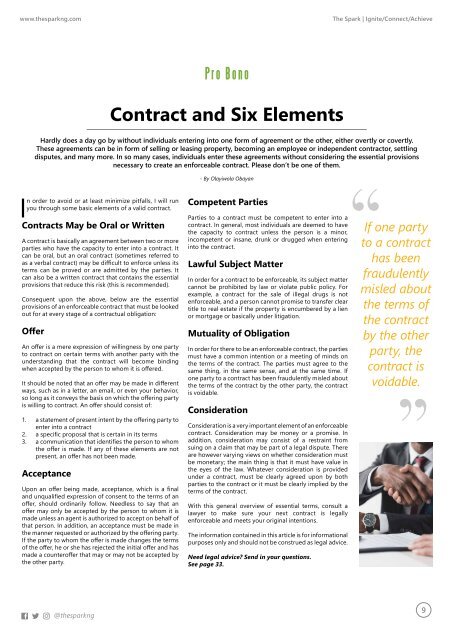The Spark Magazine (Jan 2018)
Create successful ePaper yourself
Turn your PDF publications into a flip-book with our unique Google optimized e-Paper software.
www.thesparkng.com<br />
<strong>The</strong> <strong>Spark</strong> | Ignite/Connect/Achieve<br />
Pro Bono<br />
Contract and Six Elements<br />
Hardly does a day go by without individuals entering into one form of agreement or the other, either overtly or covertly.<br />
<strong>The</strong>se agreements can be in form of selling or leasing property, becoming an employee or independent contractor, settling<br />
disputes, and many more. In so many cases, individuals enter these agreements without considering the essential provisions<br />
necessary to create an enforceable contract. Please don’t be one of them.<br />
- By Olayiwola Obayan<br />
In order to avoid or at least minimize pitfalls, I will run<br />
you through some basic elements of a valid contract.<br />
Contracts May be Oral or Written<br />
A contract is basically an agreement between two or more<br />
parties who have the capacity to enter into a contract. It<br />
can be oral, but an oral contract (sometimes referred to<br />
as a verbal contract) may be difficult to enforce unless its<br />
terms can be proved or are admitted by the parties. It<br />
can also be a written contract that contains the essential<br />
provisions that reduce this risk (this is recommended).<br />
Consequent upon the above, below are the essential<br />
provisions of an enforceable contract that must be looked<br />
out for at every stage of a contractual obligation:<br />
Offer<br />
An offer is a mere expression of willingness by one party<br />
to contract on certain terms with another party with the<br />
understanding that the contract will become binding<br />
when accepted by the person to whom it is offered.<br />
It should be noted that an offer may be made in different<br />
ways, such as in a letter, an email, or even your behavior,<br />
so long as it conveys the basis on which the offering party<br />
is willing to contract. An offer should consist of:<br />
1. a statement of present intent by the offering party to<br />
enter into a contract<br />
2. a specific proposal that is certain in its terms<br />
3. a communication that identifies the person to whom<br />
the offer is made. If any of these elements are not<br />
present, an offer has not been made.<br />
Acceptance<br />
Upon an offer being made, acceptance, which is a final<br />
and unqualified expression of consent to the terms of an<br />
offer, should ordinarily follow. Needless to say that an<br />
offer may only be accepted by the person to whom it is<br />
made unless an agent is authorized to accept on behalf of<br />
that person. In addition, an acceptance must be made in<br />
the manner requested or authorized by the offering party.<br />
If the party to whom the offer is made changes the terms<br />
of the offer, he or she has rejected the initial offer and has<br />
made a counteroffer that may or may not be accepted by<br />
the other party.<br />
Competent Parties<br />
Parties to a contract must be competent to enter into a<br />
contract. In general, most individuals are deemed to have<br />
the capacity to contract unless the person is a minor,<br />
incompetent or insane, drunk or drugged when entering<br />
into the contract.<br />
Lawful Subject Matter<br />
In order for a contract to be enforceable, its subject matter<br />
cannot be prohibited by law or violate public policy. For<br />
example, a contract for the sale of illegal drugs is not<br />
enforceable, and a person cannot promise to transfer clear<br />
title to real estate if the property is encumbered by a lien<br />
or mortgage or basically under litigation.<br />
Mutuality of Obligation<br />
In order for there to be an enforceable contract, the parties<br />
must have a common intention or a meeting of minds on<br />
the terms of the contract. <strong>The</strong> parties must agree to the<br />
same thing, in the same sense, and at the same time. If<br />
one party to a contract has been fraudulently misled about<br />
the terms of the contract by the other party, the contract<br />
is voidable.<br />
Consideration<br />
Consideration is a very important element of an enforceable<br />
contract. Consideration may be money or a promise. In<br />
addition, consideration may consist of a restraint from<br />
suing on a claim that may be part of a legal dispute. <strong>The</strong>re<br />
are however varying views on whether consideration must<br />
be monetary; the main thing is that it must have value in<br />
the eyes of the law. Whatever consideration is provided<br />
under a contract, must be clearly agreed upon by both<br />
parties to the contract or it must be clearly implied by the<br />
terms of the contract.<br />
With this general overview of essential terms, consult a<br />
lawyer to make sure your next contract is legally<br />
enforceable and meets your original intentions.<br />
<strong>The</strong> information contained in this article is for informational<br />
purposes only and should not be construed as legal advice.<br />
Need legal advice? Send in your questions.<br />
See page 33.<br />
“<br />
If one party<br />
to a contract<br />
has been<br />
fraudulently<br />
misled about<br />
the terms of<br />
the contract<br />
by the other<br />
party, the<br />
contract is<br />
voidable.<br />
“<br />
@thesparkng<br />
9


















